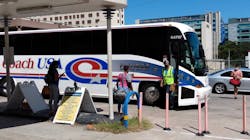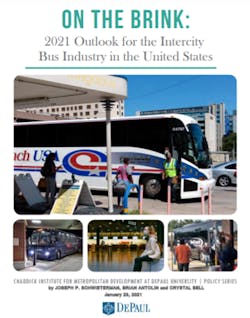Rocky Road for Industry Bus Lines—But Hope for Summer: A Study by DePaul University
The latest installment of DePaul University’s annual assessment of the intercity bus industry highlights the difficult conditions facing the sector amid the pandemic. Bookings for travel on scheduled bus lines such as Greyhound, Megabus and Flixbus ended 2020 in the Northeast region at just 16 percent of the previous year’s levels and at 24 percent of last year in the West.
Bookings were somewhat stronger in other parts of the country, at 32 – 38 percent of last year. Yet Joe Schwieterman, one of the authors of On the Brink: 2021 Outlook for the Intercity Bus Industry, warns “cash shortfalls will make the next five or six months a tumultuous time for scheduled bus lines, particularly those with asset-intensive business models.”
These shortfalls, the study’s authors predict, could cause “a major carrier (or perhaps some combination of smaller carriers), to dramatically downsize service or even shut down entirely, and dispose of equipment.” Such a move, the study notes, could greatly affect mobility for lower-income groups. The study argues that preventing this will require a more favorable set of policies to emerge from Washington, D.C.
The Coronavirus Response and Relief Supplemental Appropriations Act, enacted in late December 2020, provides temporary relief for the ailing intercity bus industry. The amount of financial support set aside for motorcoaches in this legislation, however, is relatively meager. It includes just $2 billion to be divided up between all types of motorcoach operators (including charter and tour companies), private school bus operators and passenger maritime vessels. This was far short of the $10 billion that motorcoach advocacy groups requested. The study estimates that revenue losses to scheduled intercity bus operators alone in the first year of the pandemic will exceed $1.5 billion, with more losses this coming year.
Encouraging news about summer demand
Despite all these problems, the authors see signs of optimism. Intercity bus lines made a variety of strategic moves last year, including experimentation with new booking platforms and service enhancements. The authors believe a recovery in traffic will start around mid-July, when summer travel demand is normally near its peak, air and rail fares rise in response to seasonal demand and vaccines are widely administered to all age groups.
“Almost all universities should return to in-person classes by late summer and we expect to see renewed vitality in the central business districts of major cities—the lifeblood of many intercity bus services,” noted Brian Antolin, one of the authors and an advisor to DePaul’s Chaddick Institute, which produced the study.
The authors anticipate that summer bookings could rise toward 60 percent of pre-pandemic levels by the end of summer, roughly twice the rate today.
“The financial strain facing bus companies will continue, but conditions, thankfully, should be greatly improved by mid-summer,” noted Crystal Bell, who is also a study author.
DePaul’s Chaddick Institute is holding a one-hour webinar to discuss the outlook for the industry on Feb. 19. To download the study, click here. To register for the event or reach the study team, email [email protected].




